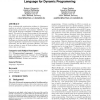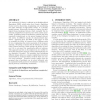844 search results - page 154 / 169 » Generalized crowding for genetic algorithms |
135
click to vote
SAC
2006
ACM
15 years 1 months ago
2006
ACM
Many combinatorial optimization problems in biosequence analysis are solved via dynamic programming. To increase programming productivity and program reliability, a domain specifi...
130
Voted
KI
2010
Springer
15 years 8 days ago
2010
Springer
Abstract. In mobile and ubiquitous computing, there is a strong need for supporting different users with different interests, needs, and demands. Activity recognition systems for c...
153
Voted
GECCO
2011
Springer
14 years 5 months ago
2011
Springer
In recent years there have been efforts to develop a probabilistic framework to explain the workings of a Learning Classifier System. This direction of research has met with lim...
254
click to vote
IHI
2012
13 years 9 months ago
2012
Despite recent progress in high-throughput experimental studies, systems level visualization and analysis of large protein interaction networks (ppi) remains a challenging task, g...
159
Voted
GECCO
2007
Springer
15 years 5 months ago
2007
Springer
The traditional GA theory is pillared on the Building Block Hypothesis (BBH) which states that Genetic Algorithms (GAs) work by discovering, emphasizing and recombining low order ...



